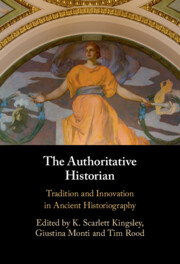Book contents
- The Authoritative Historian
- The Authoritative Historian
- Copyright page
- Dedication
- Contents
- Contributors
- Preface
- Abbreviations
- Introduction
- Part I Myth, Fiction, and the Historian’s Authority
- Part II Dislocating Authority in Herodotus’ Histories
- Part III Performing Collective and Personal Authority
- Chapter 9 Singing and Dancing Pindar’s Authority
- Chapter 10 Authority, Experience, and the Vicarious Traveller in Herodotus’ Histories
- Chapter 11 Veni, vidi, vici
- Chapter 12 Self-Praise and Self-Presentation in Plutarch
- Part IV Generic Transformations
- Part V Innovation within Tradition
- Bibliography
- Index Locorum
- General Index
Chapter 9 - Singing and Dancing Pindar’s Authority
from Part III - Performing Collective and Personal Authority
Published online by Cambridge University Press: 02 December 2022
- The Authoritative Historian
- The Authoritative Historian
- Copyright page
- Dedication
- Contents
- Contributors
- Preface
- Abbreviations
- Introduction
- Part I Myth, Fiction, and the Historian’s Authority
- Part II Dislocating Authority in Herodotus’ Histories
- Part III Performing Collective and Personal Authority
- Chapter 9 Singing and Dancing Pindar’s Authority
- Chapter 10 Authority, Experience, and the Vicarious Traveller in Herodotus’ Histories
- Chapter 11 Veni, vidi, vici
- Chapter 12 Self-Praise and Self-Presentation in Plutarch
- Part IV Generic Transformations
- Part V Innovation within Tradition
- Bibliography
- Index Locorum
- General Index
Summary
This chapter revisits the issue of poetic authority, focusing on a selection of Pindar’s song-dances, mainly epinicians, paeans, dithyrambs, and hyporchemes. It responds to John Marincola’s introductory discussion of the background to historiographical authority in his Authority and Tradition in Greek Historiography.
- Type
- Chapter
- Information
- The Authoritative HistorianTradition and Innovation in Ancient Historiography, pp. 179 - 205Publisher: Cambridge University PressPrint publication year: 2023

